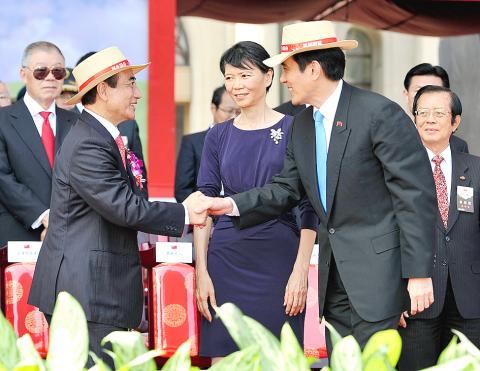President Ma Ying-jeou (馬英九) and Legislative Speaker Wang Jin-pyng (王金平) yesterday talked and shook hands at the Double Ten National Day celebration, as the two met for the first time since Ma accused Wang of improper lobbying, leading to a serious political rift.
The interaction between Ma and Wang became the center of attention at the ceremony amid calls from politicians and the public to end the so-called “September political strife.”
As a gesture of goodwill, Ma addressed Wang as “Legislative Speaker Wang” in his Double Ten National Day speech, after seeking his ouster as head of the legislature earlier.

Photo: Liao Chen-huei, Taipei Times
Wang praised the eight national prospects Ma presented in his speech.
The two exchanged handshakes five times throughout the two-hour ceremony, and chatted about the performance on several occasions. First lady Chow Mei-ching (周美青), who was seated between the two, also talked with both of them during the ceremony.
The political impasse between Ma and Wang began when the Chinese Nationalist Party (KMT), with Ma as chairman, revoked Wang’s membership over allegations of improper lobbying.
The KMT has lately softened its stance, saying it would not appeal Wang’s injunction suit against the KMT’s revocation of his membership.
As the director of the National Day Celebration Organizing Committee, Wang yesterday accompanied Ma throughout the ceremony. He entered the Presidential Office to accompany Ma to the ceremony at 10am and explained the ceremony’s procedures to the first couple.
As they watched the performance, Ma and Wang both put on straw hats prepared by the committee. The normally poker-faced Chow wore a smile and even helped Ma adjust jos hat, creating a cordial atmosphere at the ceremony.
When Wang entered the Presidential Office and invited Ma and Chow to attend the ceremony, Ma and Wang discussed a wide range of topics from the design of the ceremony’s stage to the weather and Wang’s morning walks, Presidential Office spokesperson Lee Chia-fei (李佳霏) said.
Lee said the two did not touch on the issues of improper lobbying or wiretapping.
Wang shrugged off media questions if his interaction with the president signified that they had broken the ice, saying: “There is no ice to break.”
Ma did not comment on his interaction with Wang. However, in his speech, the president stressed the importance of judicial independence in building a civil and democratic society.
The remarks echoed his previous pledges to seek justice and defend judicial independence in dealing with allegations involving improper lobbying by Wang.

SECURITY: As China is ‘reshaping’ Hong Kong’s population, Taiwan must raise the eligibility threshold for applications from Hong Kongers, Chiu Chui-cheng said When Hong Kong and Macau citizens apply for residency in Taiwan, it would be under a new category that includes a “national security observation period,” Mainland Affairs Council (MAC) Minister Chiu Chui-cheng (邱垂正) said yesterday. President William Lai (賴清德) on March 13 announced 17 strategies to counter China’s aggression toward Taiwan, including incorporating national security considerations into the review process for residency applications from Hong Kong and Macau citizens. The situation in Hong Kong is constantly changing, Chiu said to media yesterday on the sidelines of the Taipei Technology Run hosted by the Taipei Neihu Technology Park Development Association. With

CARROT AND STICK: While unrelenting in its military threats, China attracted nearly 40,000 Taiwanese to over 400 business events last year Nearly 40,000 Taiwanese last year joined industry events in China, such as conferences and trade fairs, supported by the Chinese government, a study showed yesterday, as Beijing ramps up a charm offensive toward Taipei alongside military pressure. China has long taken a carrot-and-stick approach to Taiwan, threatening it with the prospect of military action while reaching out to those it believes are amenable to Beijing’s point of view. Taiwanese security officials are wary of what they see as Beijing’s influence campaigns to sway public opinion after Taipei and Beijing gradually resumed travel links halted by the COVID-19 pandemic, but the scale of

A US Marine Corps regiment equipped with Naval Strike Missiles (NSM) is set to participate in the upcoming Balikatan 25 exercise in the Luzon Strait, marking the system’s first-ever deployment in the Philippines. US and Philippine officials have separately confirmed that the Navy Marine Expeditionary Ship Interdiction System (NMESIS) — the mobile launch platform for the Naval Strike Missile — would take part in the joint exercise. The missiles are being deployed to “a strategic first island chain chokepoint” in the waters between Taiwan proper and the Philippines, US-based Naval News reported. “The Luzon Strait and Bashi Channel represent a critical access

Pope Francis is be laid to rest on Saturday after lying in state for three days in St Peter’s Basilica, where the faithful are expected to flock to pay their respects to history’s first Latin American pontiff. The cardinals met yesterday in the Vatican’s synod hall to chart the next steps before a conclave begins to choose Francis’ successor, as condolences poured in from around the world. According to current norms, the conclave must begin between May 5 and 10. The cardinals set the funeral for Saturday at 10am in St Peter’s Square, to be celebrated by the dean of the College